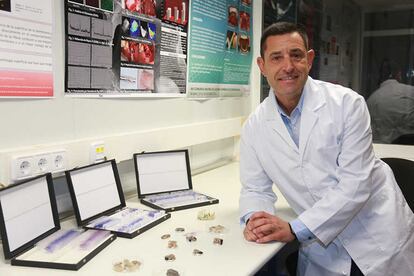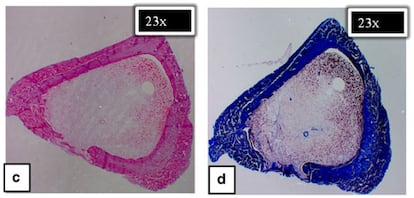Dentist José Luis Calvo Guirado joins the top 20 scientists whose studies have been retracted
The former professor at the Catholic University of Murcia asserts that he has never cheated in his life, but a dozen journals have already withdrawn 34 of his studies due to irregularities

The dentist José Luis Calvo Guirado was a professor at the Catholic University of Murcia (Spain) until 2021. Now he has joined the ignominious list of the top 20 scientists in the world with the most studies withdrawn due to irregularities, according to the American organization Retraction Watch’s latest count. A dozen journals have already retracted 34 of his studies that are plagued by anomalies, such as reusing the same images over and over again in different experiments with dogs and rabbits. Calvo Guirado, who is one of the most cited scientists in the world, according to Stanford University, maintains that he has never cheated in “anything” in his life.
The researcher’s website says that he was born “in a modest neighborhood” in the Argentine city of San Juan. “From a young age, he was very clear that his dream was to prosper and achieve great things in order to become like the other boys around him,” his brief official biography states. According to his story, Calvo Guirado was in the Argentine Army for a few years, studied dentistry and opened his own dental clinic in the city of Murcia (Spain). “José Luis is a serious, honest, responsible, hard-working, fearless, fun, healthy, athletic individual and a great strategist […] That is why he is where he is,” says his website.
Alarms about his work sounded in 2018. The journal Clinical Oral Implants Research, by academic publishers Wiley, retracted 18 studies by Calvo Guirado in just six months. One of these research studies included photographs used to illustrate experimental dental implants in laboratory Beagles. The same photographs were used in similar study with Foxhounds. The dentist then assured EL PAÍS that it was all “a matter of envy” and involuntary mistakes. “I wonder if the journal was waiting for us to make a mistake to discredit us,” he said.
The trickle of retractions has turned into a stream, and there are now 10 specialist journals from five different publishers that have withdrawn 34 studies by Calvo Guirado. But the dentist maintains his version of the great conspiracy against him. “This is something that came to me out of the blue. They have started to go after me, like when they find a scapegoat and start blaming them,” he says by phone.
The dentist states that he has hired “an international law firm” to defend himself on a case-by-case basis. “I have put it in the hands of international justice. They have all been reported, and I am waiting for the resolution,” he says without giving any details.
Calvo Guirado’s 34th retraction came a month ago. Clinical Oral Investigations, from the American publisher Springer, withdrew a study on experimental dental implants performed on the tibias of live rabbits, after finding images that had apparently been repeated and manipulated through rotations. The same publication retracted another study from 2013 two years ago.
The retraction note is devastating. Those responsible for the magazine reported that a dozen medical images from the study on rabbits appear in other studies illustrating experiments that have nothing to do with it. One of the images, a microscope photograph of a rabbit bone, was published in five different studies. The main author along with Calvo Guirado is Piedad Ramírez Fernández, then at the University of Murcia and now a professor at the Catholic University of Murcia. She is co-author of 14 of the scientific investigations that have been retracted.

The Catholic University of Murcia, a private institution that was created in 1996 and is supported by the Vatican, has more than 21,000 students. When it was founded, the president of the city’s public university stated that it was “a Mickey Mouse operation.” The college has since made efforts to improve its research profile, recruiting highly reputable scientists, such as Juan Carlos Izpisua, who created embryos with pig and human cells in Murcia in 2017, with the ultimate goal of using pigs to create human organs to be used in transplants.
Calvo Guirado was a professor at the Catholic University between 2015 and 2021, a period in which he authored 11 of the studies that have now been retracted. The institution boasted that its professor was “ranked fifteenth in the world in research on dental implantology.” A spokesperson for the university now simply states that the dentist “no longer has any connection” with the academic organization, and gives no further explanations. According to Calvo Guirado, he reached an agreement not to renew his contract. His other 23 retracted studies were published between 2009 and 2015, when he was a professor at the University of Murcia.
A team from the University of Trieste (Italy) analyzed the phenomenon of scientific fraud in dentistry a little over a year ago. “Calvo Guirado is at the center of the worst scandal in history in the field of dental research,” the authors, led by surgeon Claudio Stacchi, declared in Integrity of Scientific Research. The analysis highlighted that some of Calvo Guirado’s collaborators share a multitude of retracted studies with him, such as the Colombian Rafael Delgado Ruiz (about 20 retracted studies), the aforementioned Piedad Ramírez (14), and José Eduardo Maté (8), who was also a professor at the Catholic University of Murcia. EL PAÍS has asked Ramírez and Maté for their version of the events, but has so far received no response.
“The fact that a well-known and respected researcher like José Luis Calvo Guirado has been involved in such a scandal should deeply worry the scientific community,” says Stacchi, president-elect of the Italian Society of Oral Surgery. The expert attributes the irregularities to the current methods of evaluating science, which reward scientists — with salary increases, promotions, prestige in the global scientific rankings, and greater funding — based on the quantity of studies they publish and not their quality. “This cannot be a justification, but it is absurd to hide what has happened to Calvo Guirado. This is just the tip of an iceberg that we are not yet able to see in its entirety, but that we know exists, and we know it is enormous,” says the Italian.
Stacchi recalls that the current scientific system faces “the proliferation of predatory or semi-predatory journals,” which publish any insubstantial study as long as the authors pay the publication fees. The surgeon urges strengthening computer systems to immediately detect repeated images or plagiarized texts. In Spain, the university quality watchdog, the National Agency for Quality Assessment and Accreditation (ANECA), is modifying its evaluation criteria for researchers, with the aim of putting a stop to judging their publications by volume.
Rafael Delgado Ruiz worked at the University of Murcia until 2012 and is co-author of 20 retracted studies by Calvo Guirado. “I collaborated on the articles in the editing and grammar part in English,” he says.
“I believe there was a component of over-enthusiasm, ignorance of specific copyright issues, and mixing of image files, which resulted in similar images being submitted. Unfortunately, the retractions will remain with us like an indelible stain, and one retraction weighs more than hundreds of published articles,” says the Colombian, who has been a professor for a decade at Stony Brook University in New York. The Argentine dentist was also an unpaid professor at the American institution, but a spokesperson confirms that the university ended their relationship with him in 2022.
Dentist Lisa Heitz-Mayfield, from the University of Western Australia, was the editor-in-chief of the journal Clinical Oral Implants Research when the publication retracted Calvo Guirado’s first 18 studies in 2018. “Neither I nor any of my team of associate editors are trying to persecute any researcher,” she says in response to the Argentine dentist’s insinuations that there is an international conspiracy against him. Heitz-Mayfield is still in charge of the journal. “The decision to retract a study is not made lightly or by a single person. When it is shown that the science is unreliable, and the author cannot adequately clear up any doubts, we carry out the retraction,” she says.
Calvo Guirado is a member of the editorial board of the Indian Journal of Dental Sciences, Dentistry and Oral Research, and AIMS Bioengineering, in addition to having been editor of special issues for the Switzerland-based publishing giant MDPI. The Swiss company has been accused of making millions of euros by publishing thousands of insubstantial studies. “Rewarding editors who have multiple retractions and a history of malpractice [...] sends a signal that it is acceptable to assume a leadership position despite lacking the qualities that define a competent and ethical leader,” say Jaime Teixeira da Silva and Quan-Hoang Vuong, from Phenikaa University, in Vietnam.
The Argentine dentist occupies the last place in the world top 20 compiled by Retraction Watch. In first place is the German anesthetist Joachim Boldt, from the Ludwigshafen Hospital, who has accumulated 194 retracted studies. In second and third position are two other anesthetists, the Japanese Yoshitaka Fujii (172 withdrawn studies) and Hironobu Ueshima (124). They are massive frauds that incredibly occurred for decades and for the entire world to see.
Despite his dozens of retractions, José Luis Calvo Guirado continues to share on his social media that he is “among the best researchers in the world.” The website of his clinic in Murcia proclaims: “José Luis is the same child who more than 50 years ago played in the streets of the modest neighborhood of La Virgen de Los Desamparados in San Juan, Argentina. He has not changed in all these years, and is still the same fun and happy child as he was then. José Luis has maintained his link with Josito, as he was called in Argentina, and is true to his principles.”
Do you have more information about this case or other similar ones? You can write to us at mansede@elpais.es.
Sign up for our weekly newsletter to get more English-language news coverage from EL PAÍS USA Edition
Tu suscripción se está usando en otro dispositivo
¿Quieres añadir otro usuario a tu suscripción?
Si continúas leyendo en este dispositivo, no se podrá leer en el otro.
FlechaTu suscripción se está usando en otro dispositivo y solo puedes acceder a EL PAÍS desde un dispositivo a la vez.
Si quieres compartir tu cuenta, cambia tu suscripción a la modalidad Premium, así podrás añadir otro usuario. Cada uno accederá con su propia cuenta de email, lo que os permitirá personalizar vuestra experiencia en EL PAÍS.
¿Tienes una suscripción de empresa? Accede aquí para contratar más cuentas.
En el caso de no saber quién está usando tu cuenta, te recomendamos cambiar tu contraseña aquí.
Si decides continuar compartiendo tu cuenta, este mensaje se mostrará en tu dispositivo y en el de la otra persona que está usando tu cuenta de forma indefinida, afectando a tu experiencia de lectura. Puedes consultar aquí los términos y condiciones de la suscripción digital.









































